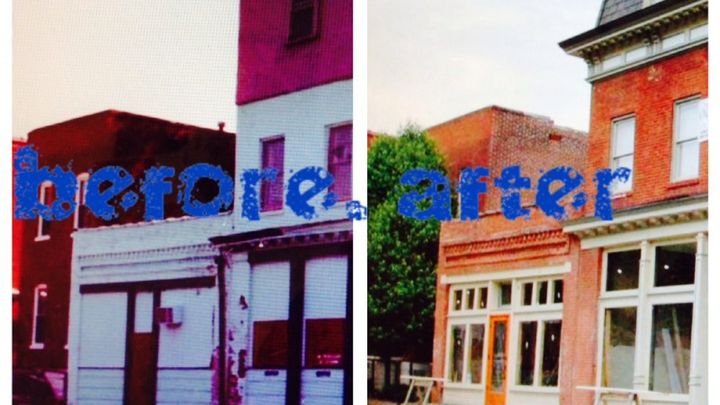
Preservation Revolving Loan Fund
Donation protected
St. Louis is graced with an extraordinary architectural legacy that is worthy of protection and celebration. The city's historic neighborhoods contain an enormous reservoir of high-quality historic buildings that remain attractive and useful for current and future generations. The merit of thousands of these historic buildings has been officially recognized through listing in the National Register of Historic Places. The protection and rehabilitation historic buildings is a priority for Landmarks Association of St. Louis.
Population decline in the latter 20th century resulted in disinvestment and even abandonment of large numbers of historic properties in St. Louis. Even buildings that have continued to be occupied have frequently suffered deleterious alteration and/or deferred maintenance. Today this trend is reversing as residents, developers, and a wide range of organizations are working to rehabilitate and revitalize historic buildings and neighborhoods.
While many historic neighborhoods in St. Louis are making great strides, it can be difficult to secure necessary funds for rehabilitation. When credit is available, it is common for lenders to finance only a percentage of the fair market value of a completed rehabilitation project. The gap between what conventional lenders are willing to provide and the total cost of a project can prevent many worthy rehabilitation efforts from ever getting started. This phenomenon slows down the momentum of historic rehabilitation activity and in some cases even leads to the loss of significant buildings as properties languish while necessary funds are sought.
To help mitigate these problems, many cities, states, and non-profit organizations across the country have created revolving loan programs to support historic preservation projects. By providing low interest loans to supplement conventional loans or provide the necessary starting capital to leverage existing incentive programs, a non-profit historic preservation organization can help to spur the rehabilitation of significant buildings. Terms of the loans are designed to be short (no more than two years, and in the case of façade improvement loans perhaps only a matter of months) and once they are repaid, the money simply “revolves” back into another project. The modest proceeds derived from interest are used to cover administrative costs and the success of completed projects used to attract donations to grow the fund.
Landmarks Association of St. Louis has been granted a $75,000 challenge grant from a generous local foundation to create a pilot project for st. Louis that is designed to test the efficacy of a low interest loan program for supporting historic rehabilitation projects.
The proposed fund will provide gap financing for rehabilitation projects and also be made available to help property owners to reverse unsightly alterations to historic buildings by facilitating participation in St. Louis' existing façade improvement grant program.
In order to receive the $75,000 challenge grant, Landmarks Association needs to raise a minimum of $25,000 as a match. To date, we have secured $13,335 of the needed match, leaving us with a fundraising goal of $11,645.
Please help us get this pioneering program off the ground and support the rehabilitation of St. Louis' incredible historic buildings!
Population decline in the latter 20th century resulted in disinvestment and even abandonment of large numbers of historic properties in St. Louis. Even buildings that have continued to be occupied have frequently suffered deleterious alteration and/or deferred maintenance. Today this trend is reversing as residents, developers, and a wide range of organizations are working to rehabilitate and revitalize historic buildings and neighborhoods.
While many historic neighborhoods in St. Louis are making great strides, it can be difficult to secure necessary funds for rehabilitation. When credit is available, it is common for lenders to finance only a percentage of the fair market value of a completed rehabilitation project. The gap between what conventional lenders are willing to provide and the total cost of a project can prevent many worthy rehabilitation efforts from ever getting started. This phenomenon slows down the momentum of historic rehabilitation activity and in some cases even leads to the loss of significant buildings as properties languish while necessary funds are sought.
To help mitigate these problems, many cities, states, and non-profit organizations across the country have created revolving loan programs to support historic preservation projects. By providing low interest loans to supplement conventional loans or provide the necessary starting capital to leverage existing incentive programs, a non-profit historic preservation organization can help to spur the rehabilitation of significant buildings. Terms of the loans are designed to be short (no more than two years, and in the case of façade improvement loans perhaps only a matter of months) and once they are repaid, the money simply “revolves” back into another project. The modest proceeds derived from interest are used to cover administrative costs and the success of completed projects used to attract donations to grow the fund.
Landmarks Association of St. Louis has been granted a $75,000 challenge grant from a generous local foundation to create a pilot project for st. Louis that is designed to test the efficacy of a low interest loan program for supporting historic rehabilitation projects.
The proposed fund will provide gap financing for rehabilitation projects and also be made available to help property owners to reverse unsightly alterations to historic buildings by facilitating participation in St. Louis' existing façade improvement grant program.
In order to receive the $75,000 challenge grant, Landmarks Association needs to raise a minimum of $25,000 as a match. To date, we have secured $13,335 of the needed match, leaving us with a fundraising goal of $11,645.
Please help us get this pioneering program off the ground and support the rehabilitation of St. Louis' incredible historic buildings!
Organizer
Ruth Keenoy
Organizer
St Louis, MO